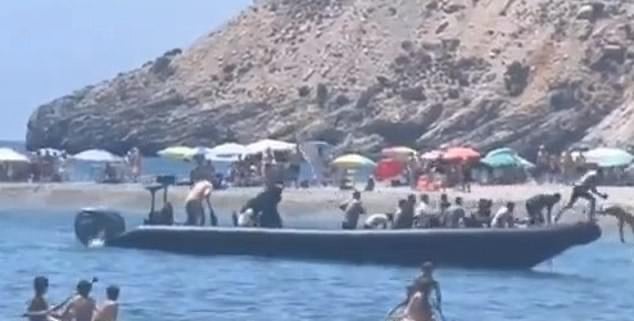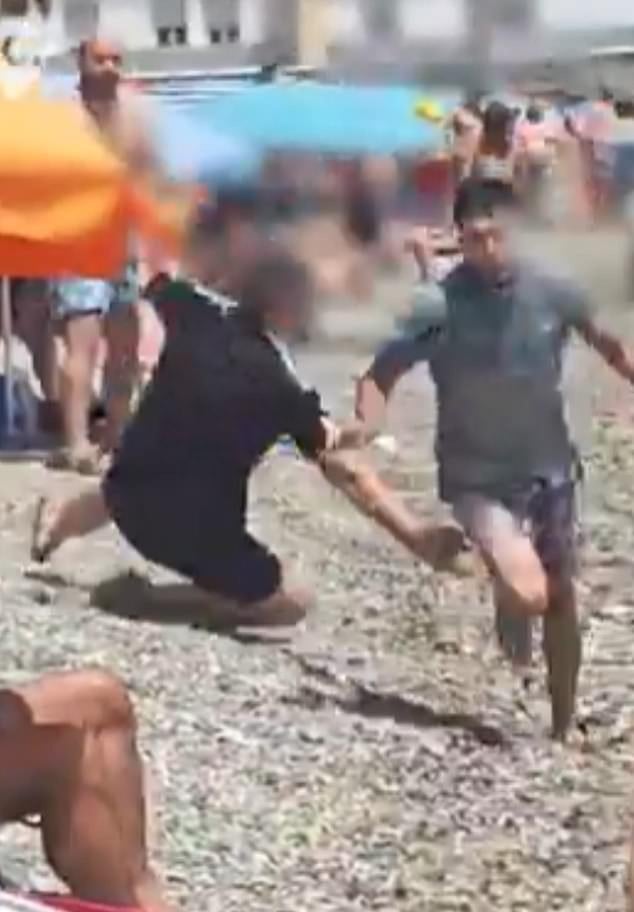Holidaymakers intervened to detain around a dozen migrants who landed on a crowded Spanish beach in dramatic scenes that witnesses described as “surreal” on Sunday afternoon.
The incident unfolded at approximately 2pm on Sotillo Beach in Castell de Ferro, Granada, when a speedboat packed with young men of Moroccan origin arrived at the shore in front of stunned families enjoying the popular tourist destination.
Footage shared on social media shows 13 men diving from the vessel into the Mediterranean waters before swimming to shore and attempting to flee, prompting some beachgoers to chase and physically restrain them until authorities arrived.
Broad Daylight Landing Shocks Tourists
The boat approached the beach at an unusually slow pace, crossing through the nautical corridor designated for swimmers before stopping just five metres from the shoreline. According to witnesses, the occupants began throwing objects into the water before jumping overboard one by one.
Restaurant owner Alberto Garcia, whose establishment overlooks the beach, told local newspaper Ideal: “We all stood there staring, not quite knowing what was happening. We thought it was a recreational boat, but when we saw that they started throwing objects into the water and people starting to get out, we realised it wasn’t normal.”
“What surprised us most was that the boat was moving very slowly, as if they weren’t in a hurry or afraid. They went in where there were most people, as if nothing had happened, and stopped five metres from the shore,” Garcia added.
After the migrants jumped into the water, four individuals who remained on board, some wearing hoodies despite the summer heat, calmly turned the vessel around and departed the scene.

Citizens’ Arrests Lead to Nine Detentions
As the men reached the beach, their tactics varied – some immediately sprinted along the sand whilst others attempted to blend in with the crowd of sunbathers. However, several beachgoers took action to prevent their escape.
Video footage captured a man wearing only orange swimming trunks pinning one of the migrants to the ground, sitting on top of him until police arrived. Another clip showed a beachgoer escorting a man out of the sea. The detained individual appeared to plead for release whilst being held.
The Policía Local de Castell de Ferro confirmed: “The lifeguards alerted us, and we managed to catch one on the street. Then we helped identify two more. The Civil Guard did the bulk of the work and managed to arrest nine.”
The Guardia Civil transferred nine migrants of Moroccan origin, including one minor, to the Port of Motril in Granada. Those detained are now being held at a local migrant centre. The fate of the remaining four individuals who may have fled into the town remains unclear.
Isolated Incident, Officials Say
José Antonio Martos, the deputy head of Granada’s regional authority, characterised the landing as an isolated occurrence, stating: “The arrival of migrants to Granada’s beaches is very low in 2025. In fact, this is only the second boat to reach our shores this entire year.”
The incident highlights the contrast between migration patterns across Spain’s different coastal regions. Whilst Granada sees relatively few arrivals, other areas face significantly higher numbers.
Spain Grapples with Record Migration
The dramatic beach landing comes as Spain continues to experience unprecedented levels of irregular migration, particularly to the Canary Islands. According to Spain’s Interior Ministry, the country received a record 63,970 irregular migrants in 2024, with 46,843 reaching the Canary Islands alone – a 17% increase from the previous year.
The Atlantic route from West Africa to the Canary Islands has become the primary pathway for migrants attempting to reach Europe, as tighter controls in the Mediterranean push more people towards this perilous journey. EU border agency Frontex reported that whilst irregular crossings into the bloc fell 40% overall from January to November 2024, they grew 19% on the Atlantic route.
However, early 2025 data suggests a potential shift in these patterns. Between 1 January and 28 February 2025, the Canary Islands received 7,138 migrants – a 40.2% decrease compared to the same period in 2024. Meanwhile, arrivals to mainland Spain and the Balearic Islands have increased.
Deadly Crossing Claims Thousands
The human cost of these journeys remains devastating. NGO Caminando Fronteras (Walking Borders) reported that at least 10,457 migrants died or disappeared whilst attempting to reach Spain by sea in 2024 – a 50% increase from 2023 and the highest toll since records began in 2007.
The organisation revealed that 1,865 people were recorded as dead or missing in just the first five months of 2025, including 112 women and 342 children. Thirty-eight boats disappeared with all passengers on board during this period.
The deadliest route remains the Atlantic crossing from West Africa to the Canary Islands, where migrants often travel more than 1,000 miles in overcrowded, unseaworthy vessels. The Strait of Gibraltar, separating Morocco from mainland Spain, claimed 52 lives in the same period.
Recent Rescue Operations
The Castell de Ferro incident occurred just weeks after Spanish sailors rescued an exhausted migrant attempting to cross the Strait of Gibraltar using only flippers and a rubber ring. The man, believed to be Moroccan, was spotted approximately 12 miles off the coast of Málaga in July.
Footage showed the migrant, strapped to a rubber ring, being pulled aboard a sailboat by a family en route to the Balearic Islands. The sailors provided him with clothing, blankets, water and food before coastguard vessels collected him and transferred him to the port of Málaga.
Growing Humanitarian Crisis
The arrivals have overwhelmed local authorities, particularly in the Canary Islands where more than 5,500 unaccompanied minors are currently held in government facilities. Spain’s political parties have failed to agree on a plan to distribute these children nationwide to ease the burden.
Government minister Ángel Víctor Torres criticised the conservative opposition Popular Party for the impasse, telling Cadena SER radio: “The children would be going to school, learning our language and integrating into our society if the PP adopted an attitude of true solidarity.
The Spanish government announced in December that it would grant residency and work permits to approximately 300,000 undocumented people living in Spain each year for the next three years as part of what officials describe as the “most comprehensive and ambitious” migration reform in more than a decade.
As debate continues over Spain’s response to irregular migration, Sunday’s incident at Castell de Ferro serves as a stark reminder that the phenomenon affects not just remote islands but also popular tourist destinations on the mainland, bringing the reality of Europe’s migration crisis directly onto its holiday beaches.
Follow for more updates on Britannia Daily



